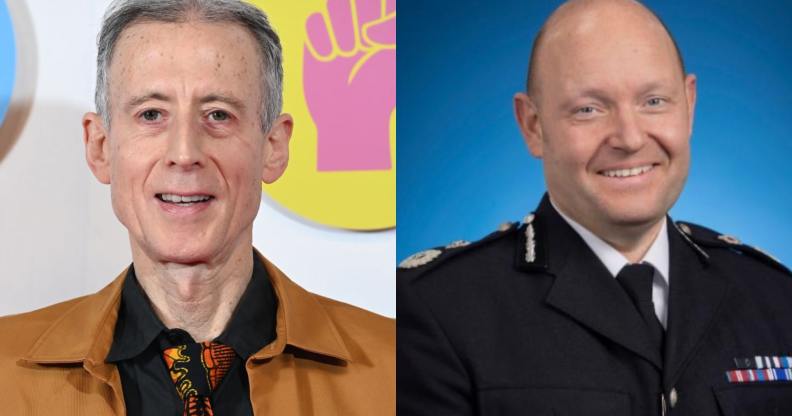West Midlands Police refuses to apologise for history of homophobic ‘witch hunts’

LGBTQ+ rights activist Peter Tatchell (right) has condemned West Midlands Police chief constable Craig Guildford’s refusal to formally apologise for past homophobia in the force. (Getty/West Midlands Police)
West Midlands Police has refused to apologise for past homophobic “witch hunts” after being urged to make reparations by human rights activist Peter Tatchell.
Tatchell had called for the apology, accusing the force of being “one of the most zealously homophobic police forces in the country, with arrest figures way above the national average” before the full decriminalisation of homosexuality in 2003.
The force had reportedly released names, addresses and workplaces of men arrested for being gay, leading to extreme – and in some cases – violent repercussions on those involved.
In a letter received by The Peter Tatchell Foundation – an organisation which seeks to promote and protect the human rights of individuals and communities, both in the UK and internationally – chief constable Craig Guildford declined the invitation to make a formal apology.
The force was asked to apologise as part of the nationwide #ApologiseNow campaign, which will be launched in the House of Lords on Wednesday 7 June by the Peter Tatchell Foundation, in partnership with Baroness Helena Kennedy KC.
‘The role of the police is to apply the laws’
In his letter, Guildford, who Tatchell previously said is the current “head of the force that witch-hunted us and wrecked LGBT+ lives”, said: “The role of the police is to apply the laws made by politicians who you and I elect as citizens of this country without fear of favour.
“There is still work to do to ensure everyone within the West Midlands, and indeed this country feels safe and happy to be who they are, to love who they truly love, and to be their whole self both in the workplace and in public without judgement or fear.
“Historically, West Midlands Police, like all other police forces in England and Wales, was responsible for enforcing laws which we all would view very differently today.”
Tatchell said Guilford’s response was “disingenuous” as the request was “for an apology for the often illegal and abusive way they enforced anti-gay legislation”, not for enforcing the law.
“Officers disparaged LGBTs as ‘poofs’ and ‘queers’. They gave the names and addresses of arrested gay men to local papers, which led to them sacked and violently assaulted,” Tatchell continued.
“They arrested men for mere kissing and dancing together, which was not against the law. Officers also tried to shut down gay bars and clubs and harassed LGBTs leaving gay venues, pushing, shoving and insulting them with homophobic epithets.”
The chief constable’s response follows him receiving the request for an apology by hand at Birmingham Pride on 27 May, after he failed to respond to multiple prior letters and emails sent.
Guilford added that “legislation came into effect on 1 October 2012 that allows people in England with convictions and cautions for acts (which are no longer unlawful), to apply to the Home Office to have these offences disregarded from their criminal records”.
Protection of Freedoms Act introduced rights for gay men with historic convictions
The Sexual Offences Act 2003 decriminalised consensual sex between men, abolishing the offences of buggery and gross indecency. Years later, in 2012, the Protection of Freedoms Act introduced rights for men with historic convictions and cautions on their records to apply to the to have them “disregarded”.
Tatchell, who called the West Midlands force “one of the most homophobic in Britain”, added: “A formal apology would draw a line under past homophobic persecution and help improve LGBT+ trust and confidence in the police to report hate crime, domestic abuse and sexual assault, which is what we all want.”
In 2020, former West Midlands’ chief constable, Sir David Thompson, apologised to the Black community for the force not being “free from bias, discrimination or even racism”.
At the time, Thompson spoke at police board meeting following the death of George Floyd in the US, and said he understood the “anger towards the uniform” more now.
George Floyd, who was Black, died in Minneapolis, Minnesota, on 25 May 2020, after white police officer Derek Chauvin knelt on his neck for more than nine minutes.
In March 2023, London’s Met Police was found to be institutionally homophobic, racist and sexist by a major review.
A subsequent report found the force had not learned from the “calamitous litany of failures” witnessed in the Stephen Port investigation. The Met initially failed to connect the murders of young gay men carried out by Port.
Disturbingly, an independent inspection by His Majesty’s Inspectorate of Constabulary and Fire & Rescue Services (HMICFRS) found such failures could happen again.
How did this story make you feel?

